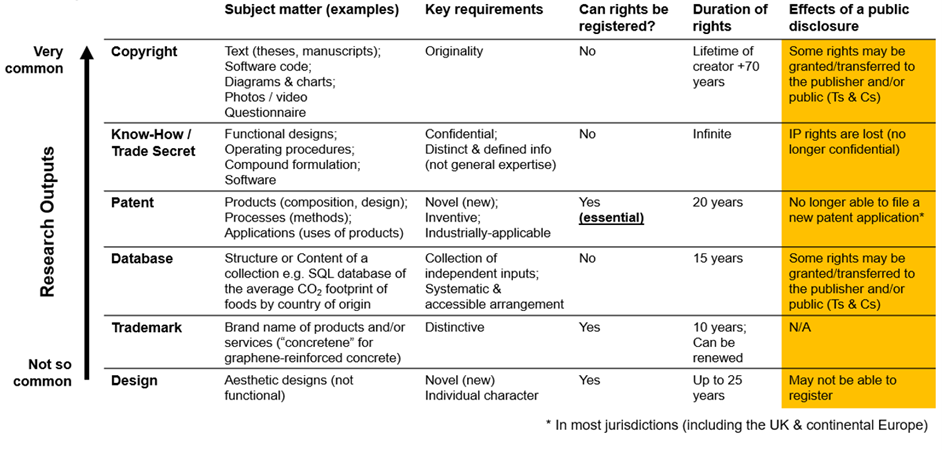What is Intellectual Property?
Watch this short video which explains the IP essentials, “Intellectual Property 101: What Every Academic Needs to Know”:
Intellectual property (IP) is a novel, or original, output of an intellectual activity. It refers to creations of the mind such as literary and artistic works, designs, symbols, names and images used in commerce, as well as inventions, industrial processes, devices, new chemical entities, software, and databases.
IP is also an area of law dealing with original and tangible creations of the mind. It defines what constitutes IP and the nature and scope of Intellectual Property Rights (IPRs). These rights provide the ability to control, receive recognition and/or financial benefit from, and prevent unauthorised use of IP, usually for a certain period of time. It relates to the transfer of, or access to, these rights between entities, for example, licensing IP rights from a university to a company.
Types of IPRs
Intellectual Property Rights (IPRs) are territorial legal rights that enable the owners of the IP to control the use of the IP by stopping unauthorised parties from performing certain acts (often with commercial gain in mind). IPRs can be bought, sold or licensed.
The main Intellectual Property Rights are:
• Patents
• Know-how
• Copyright
• Trademarks
• Design Rights
• Database Rights
Each type of IPR requires certain conditions to be met and/or actions to be taken to be valid and deliver the desired commercial protection.

Why is IP valuable?
Using IP has the potential to unlock economic, environmental and social impact through value creation.
When the Innovation Factory completes a license deal or forms a spinout, it creates an opportunity for the University to generate positive impacts from its novel research, and potentially income, without directly taking new products or services to market.
In turn, this may allow the University, and research funders, to demonstrate the impacts of their investments in research activities, as well as possibly generating funds to invest in new research activities.
Leveraging IP can help secure investment needed to take a new product or service to market. IPRs can offer strategic commercial advantages: by way of levelling the playing field between you and industry leaders, and to assist in securing a market share and building a barrier to entry for competitors.
Protecting Intellectual Property can attract third parties’ attention to a project and give rise to collaborations and further research funding.
IP Policy
The Innovation Factory is the sole agent for commercialising IP arising from the University of Manchester.
The University of Manchester’s IP policy provides a framework for the identification, ownership, protection and commercialisation of IP created, made and/or developed within the University.



